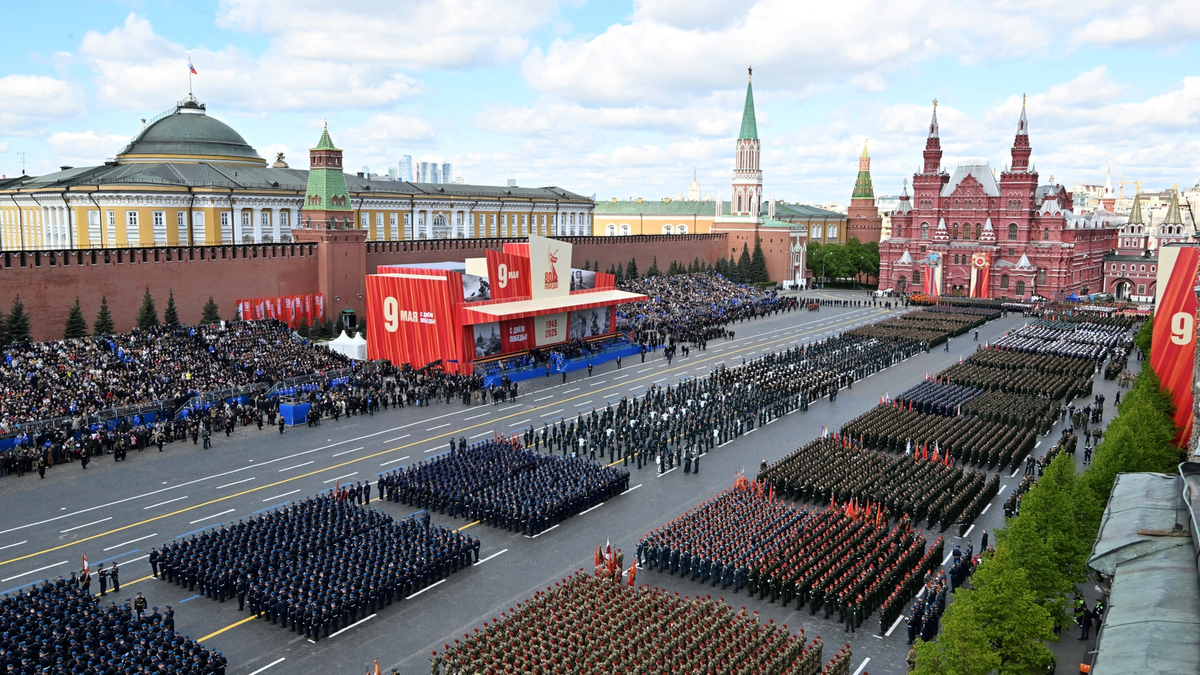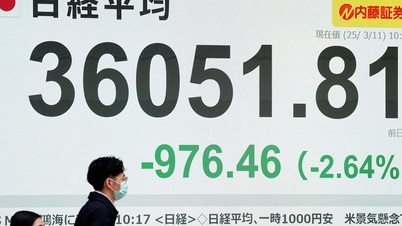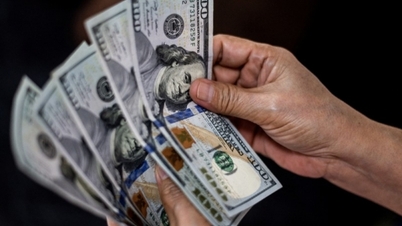 |
| On January 12, Russian gas giant Gazprom set a new historical record for daily gas deliveries via the Unified National Gas Supply System, breaking a record set nearly 10 years ago. (Source: Getty) |
World economy
Global trade outlook for 2024 less optimistic due to tensions in the Red Sea
On January 17, Director General of the World Trade Organization (WTO) Ngozi Okonjo-Iweala commented that global trade in 2024 is less optimistic due to the impact of the tense situation in the Red Sea.
Speaking to reporters at the World Economic Forum (WEF) taking place in Davos, Switzerland, the WTO leader said that weaker global economic growth, worsening geopolitical tensions, and new disruptions in the Red Sea, Suez Canal, and Panama Canal have made the global trade picture less optimistic.
Before the Hamas-Israel conflict broke out in October 2023, the WTO forecast global trade growth of 0.8% in 2023 and 3.3% in 2024. However, in her new speech, Ms. Okonjo-Iweala warned that the growth rate in 2024 could be lower.
The WTO sees a number of risks that could reduce global trade growth in 2024 compared to previous forecasts. The agency will reassess and revise its forecast in at least a month.
Yemen's Houthi rebels have attacked cargo ships in the Red Sea, disrupting a vital shipping route while shipping through the Panama Canal has been hampered by the worst drought in years, causing low water levels and forcing authorities to slow down shipping. The Houthis said they carried out attacks on Israeli-linked cargo ships in solidarity with Palestinians in the Gaza Strip and would not stop if Israel continued its military campaign in the strip.
US economy
*According to a report released by the US Department of Commerce on January 17, the country's retail sales increased beyond expectations in December 2023, causing economists to raise their economic growth estimates in the fourth quarter.
US retail sales rose 0.6% in December 2023, after rising 0.3% in November, higher than the 0.4% increase forecast by economists polled by Reuters (UK). Compared to the same month last year, retail sales rose 5.6% in December 2023.
Core retail sales in November were also revised higher to a 0.5% increase, instead of the previously reported 0.4%.
Economists forecast consumer spending, which accounts for more than 66% of US economic activity, will likely grow 2.7% in the fourth quarter, up from a previous forecast of 2.0%.
*According to the Beige Book survey report released by the US Federal Reserve (Fed) on January 17, the country's economic activity continued to maintain stability in recent weeks, thanks to consumer spending helping to offset weakness in other sectors such as manufacturing.
The report said holiday consumer spending met expectations in most of the regions surveyed by the Fed, with three, including New York, exceeding expectations. In most regions, the Fed reported little or no change in economic activity, while businesses grew increasingly optimistic about the outlook.
Chinese Economy
*Official data released on January 17 showed that China's economy grew 5.2% in the fourth quarter of 2023, slightly lower than analysts' forecasts but still enough to help China achieve its full-year growth target for 2023.
Compared with the third quarter of 2023, China's economy grew 1% in the fourth quarter of 2023, but lower than the revised growth of 1.5% in the previous quarter.
* China's oil refining output hit a record in 2023 , up 9.3% from a year earlier, as new refineries were put into operation to boost output to meet recovering fuel demand after the Covid-19 pandemic.
Data released by the National Bureau of Statistics (NBS) on January 17 showed that refineries processed 734.8 million tonnes of crude oil last year, or 14.7 million barrels per day. That was significantly higher than the 13.5 million barrels per day processed in 2022, when China's oil processing output fell for the first time in two decades of consecutive increases.
European Economy
* On January 16, the European Union Intellectual Property Office (EUIPO) assessed that counterfeit goods, mainly clothing, cost the continent's economy 16 billion euros ($17.4 billion) a year and nearly 200,000 jobs. The assessment, based on data from 2018 to 2021, showed that counterfeit goods cause major damage to the garment sector, estimated at 12 billion euros annually, or 5.2% of total revenue. The damage to the cosmetics industry is 3 billion euros and to the toy industry is 1 billion euros.
The assessment is based on the number of goods seized by police and the proportion of Europeans who admit to buying counterfeit goods in each country in the bloc.
* Russian gas corporation Gazprom said that on January 12, it set a new historical record for daily gas supply through the National Unified Gas Supply System, breaking the record set nearly 10 years ago.
Gazprom's press release said that on January 12, 1,788.3 million cubic meters of gas were supplied to Russian consumers, a historic record for daily supplies through the Unified Gas Supply System. The level recorded almost 10 years ago on January 30, 2014 was 1,786.8 million cubic meters of gas.
* The number of countries that Russians can visit by direct flights from Russia increased by 40 countries, or 25%, in December 2023 compared to the same period last year, according to the Association of Tour Operators of Russia (ATOR).
Russian and foreign airlines plan to operate direct flights from Russia to 40 countries and territories in 2024. A year earlier, there were only 32 countries on this list.
*The preliminary statistical report of the German Federal Statistical Office (Destatis) said that in 2023, the country's economy fell into a slight recession . Destatis data shows that in 2023, Germany's Gross Domestic Product (GDP) decreased by 0.3% compared to 2022.
Thus, after the first year of the Covid-19 pandemic (2020), this is the second recession of the German economy this decade. High inflation, rising interest rates and a weak global economy are the main reasons for the German economic decline.
Growth prospects for the new year remain uncertain, with Commerzbank chief economist Jörg Krämer predicting a further 0.3% contraction in 2024.
*Data from the UK's Office for National Statistics (ONS) on January 17 showed that the country's inflation unexpectedly increased in December 2023, dashing expectations of a slowdown in price growth.
The report also reduces the chances of the Bank of England (BoE) cutting interest rates soon and prolongs the cost of living crisis before the general election.
The UK consumer price index (CPI) rose slightly to 4% in December, marking the first CPI increase since February 2023, the ONS said. This figure is double the BoE's official target of 2% and is the highest among the Group of Seven (G7) leading industrialized countries.
Japanese and Korean Economy
*On January 17, the Japan National Tourism Organization (JNTO) said that the number of foreign tourists to the country increased to 25.06 million in 2023.
According to JNTO, the number of foreign visitors to Japan for business and leisure purposes reached 2.73 million in December alone, a sharp increase from the 2.44 million recorded in the previous month. This is the highest number of visitors to Japan in the last month of the year on record, even 8% higher than the level recorded before the Covid-19 pandemic in 2019.
Many experts predict that the number of tourists coming to the Land of the Rising Sun this year could surpass the record of 31.9 million people recorded in 2019.
* According to Reuters on January 16, Nippon Yusen, Japan's largest shipping company, announced that it had stopped all of its ships passing through the Red Sea , and directed its ships near the Red Sea to wait in safe areas and consider changing routes.
*South Korea's Ministry of Agriculture, Food and Rural Affairs said on January 17 that the country's food and agricultural product exports will hit a record high in 2023 thanks to the widespread popularity of Korean culinary culture K-Food.
Statistics show that the export value of agricultural and related food products reached 9.16 billion USD in 2023, up 3% over the previous year. Exports of agricultural and related food products have increased steadily in recent years from 6.1 billion USD in 2015 to 7.3 billion USD in 2019.
*On January 16, Deputy Prime Minister and Minister of Economy and Finance of South Korea Choi Sang-mok said that the government will spend more than 65% of the 2024 financial budget in the first half of this year to boost demand and improve people's livelihoods .
Of this year's 656.62 trillion won ($493.32 billion) budget, spending in the first half is estimated at 426.8 trillion won. This would be the highest amount managed in any January-June period of the respective year.
ASEAN Economy and Emerging Economies
*Indonesian Agriculture Minister Andi Amran Sulaiman affirmed on January 16 that the government will increase the budget by 14,000 billion Rupiah (about 900 million USD) to subsidize fertilizer for farmers nationwide .
People will be guaranteed adequate sources of seeds, seedlings, and fertilizers to support the development of agricultural activities, especially in the country's key food production areas.
*On January 16, at Putra University Malaysia, Malaysian Prime Minister Anwar Ibrahim launched the Artificial Intelligence (AI) for People Program, implemented through the Ministry of Economic Affairs in collaboration with Intel Malaysia.
The programme is another government initiative to bridge the digital literacy gap among Malaysians.
* The Vientiane Times on January 17 reported that Laos and Cambodia will continue to strengthen cooperation in the energy sector in the coming time. This was the content discussed when Cambodian Minister of Mines and Energy Keo Rattanak paid a courtesy call on Lao Prime Minister Sonexay Siphandone during his recent visit to the country.
According to the newspaper, to meet the growing domestic energy demand, Cambodia is importing about 25% of its energy needs from Laos, Thailand and Vietnam. Currently, the country is importing 445 MW of electricity from Laos and this figure is expected to reach 6,000 MW by 2030.
In early 2023, a 500 kilovolt transmission line over 200 km long was installed to connect the power substation in Champassak province, southern Laos, with the Cambodian border area, an important step in Laos' plan to export electricity to neighboring countries, especially Cambodia.
It is forecasted that by 2030, Laos will be able to produce an additional 5,559 MW, of which about 77.59% will come from hydropower, the remaining amount will come from solar power, wind power and coal power.
Source




![[Photo] Ho Chi Minh City: Many people release flower lanterns to celebrate Buddha's Birthday](https://vphoto.vietnam.vn/thumb/1200x675/vietnam/resource/IMAGE/2025/5/10/5d57dc648c0f46ffa3b22a3e6e3eac3e)

![[Video] 24-hour news on May 9, 2025: General Secretary To Lam officially visits the Russian Federation and attends the 80th anniversary of Victory Day in the Great Patriotic War](https://vphoto.vietnam.vn/thumb/1200x675/vietnam/resource/IMAGE/2025/5/10/5eaa6504a96747708f2cb7b1a7471fb9)
![[Photo] General Secretary To Lam meets with Chairman of the Federation Council, Parliament of the Russian Federation](https://vphoto.vietnam.vn/thumb/1200x675/vietnam/resource/IMAGE/2025/5/10/2c37f1980bdc48c4a04ca24b5f544b33)


























![[Photo] Russian military power on display at parade celebrating 80 years of victory over fascism](https://vphoto.vietnam.vn/thumb/1200x675/vietnam/resource/IMAGE/2025/5/9/ce054c3a71b74b1da3be310973aebcfd)
































































Comment (0)